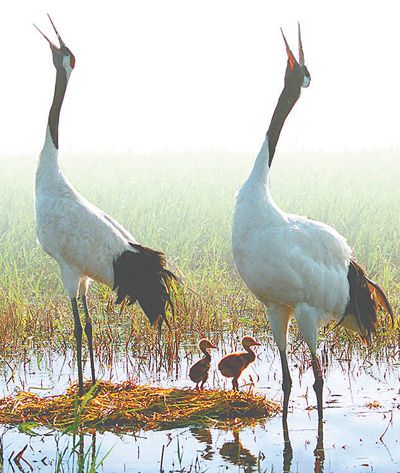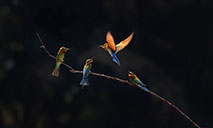Story of a family devoted to protection of red-crowned cranes
Every October, red-crowned cranes, an endangered species of crane, start migrating to the wetlands of Yancheng National Rare Bird Reserve in Yancheng city, east China’s Jiangsu province. Behind the construction of the reserve, there is a touching story.

Photo shows red-crowned cranes at Zhalong National Nature Reserve in northeast China’s Heilongjiang province. (File photo)
Protecting red-crowned cranes was a profession for Xu Xiujuan’s family. The daughter of two protection workers who had contributed to the establishment of Zhalong National Nature Reserve in northeast China’s Heilongjiang province, Xiujuan became passionate about bird breeding and wildlife protection during her childhood.
In 1981, 17-year-old Xiujuan joined her father at Zhalong National Nature Reserve. She impressed many people as she was able to raise small cranes within only three days of starting her service at the reserve.
Because of her exceptional work performance, Xiujuan went on to pursue further studies of wild animals at Northeast Forestry University, based on a recommendation. She took a year and a half to complete her studies, even though the course had originally been designed to take the average learner two years to finish. She also took English as an elective course in a bid to communicate freely with international counterparts. After a long period of diligent study, Xiujuan became able to write crane raising diaries in English.
In May 1986, 22-year-old Xiujuan traveled to Yancheng with three red-crowned crane eggs. There, she helped to establish a natural reserve and participated in an artificial hatching experiment with the eggs. The experiment marked the first case in the country in which red-crowned crane eggs were successfully hatched in the wintering grounds. Under the meticulous care of Xiujuan, on the 83rd day after their birth the little red-crowned cranes spread their wings and flew into the sky.
During her service at the Yancheng nature reserve, which lasted for one year and four months, Xiujuan published two articles on raising red-crowned cranes. At a meeting of a red-crowned crane protection committee, her articles were praised by senior industry experts.
On Sept. 16, 1987, a white swan at the reserve went missing. Xiujuan, who hadn’t recovered from an illness, spent long hours looking for it. When she heard the sound of a swan coming from the opposite side of a river, Xiujuan jumped in without hesitation and started to swim across. When she was in the middle of the river, Xiujuan felt she was gradually losing her strength. Her colleagues, who swam faster and were near the river bank, asked her to go back. But Xiujuan, who was deeply concerned about the safety of the swan, jumped into the water a second time after her colleagues left her sight. However, totally exhausted, she never reached her destination, and drowned in the river.
Xiujuan’s story had moved so many people and a song was written for her that read: “Why do the clouds shed tears in silence? Why does the wind keep whispering? I see a line of red-crowned cranes flying by so gently.”
Xiujuan was recognized as China’s first martyr in the field of environmental protection. George Archibald, then chairman of the board of the International Crane Foundation, wrote a letter to Xiujuan’s father to express his condolences which said: “I’ll never forget what an excellent job your daughter had done. Every time I looked at a flying crane, I thought of her.”
Years after Xiujuan’s death, her brother, Xu Jianfeng, gave up his job in the city and returned to their hometown at Zhalong National Nature Reserve to become a red-crowned crane protector. He devoted 18 years to the job, raising more than 100 red-crowned cranes during his service. However, Jianfeng met with the same fate as his sister. In April 2014, Jianfeng went for a routine check to inspect cranes’ nests. On the way, he lost control of his motorbike and crashed into a ditch. He died at the age of 47.
Today, a member of the family’s third generation, Xu Zhuo, niece of Xiujuan and daughter of Jianfeng, has taken over the job of protecting rare birds at Zhalong National Nature Reserve. “I want to continue the family tradition,” said Xu Zhuo.
Zhalong National Nature Reserve has adopted high-tech equipment such as positioning devices and drones to facilitate the protection work and volunteer protectors have joined the nature reserve. All these have made the protection work and management of the nature reserve more efficient.
Photos
Related Stories
- Migrating gray cranes seen at Agamon Hula Conservation Lake in Israel
- Endangered crane population surpasses 10,000 in Tibet
- Cranes welcome the arrival of spring in NE China's nature reserve
- Measures taken to protect habitat of black-necked cranes in Zhaotong, Yunnan
- Rare black-necked cranes wintering in Yunnan
- Endangered cranes welcomed by Tibetans during migration
Copyright © 2021 People's Daily Online. All Rights Reserved.










